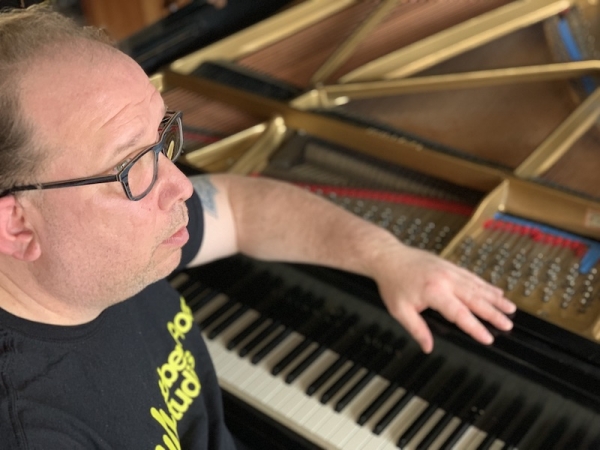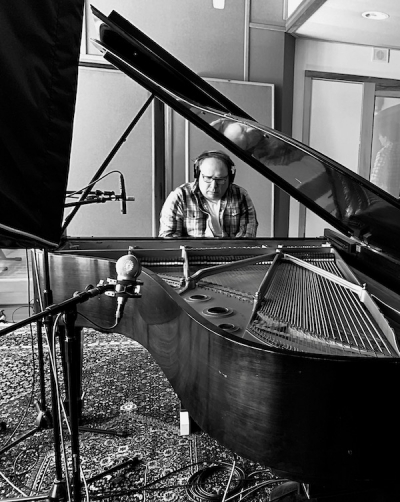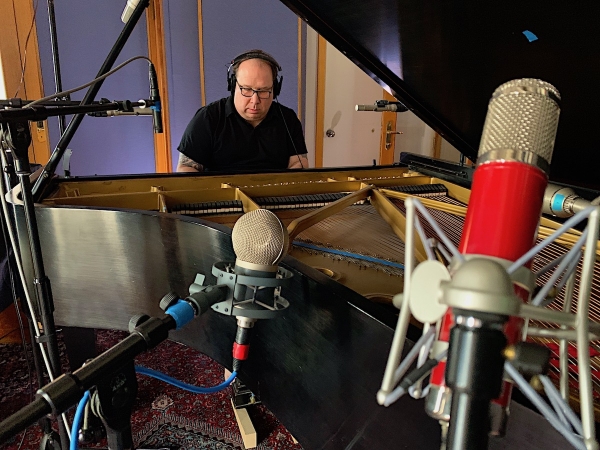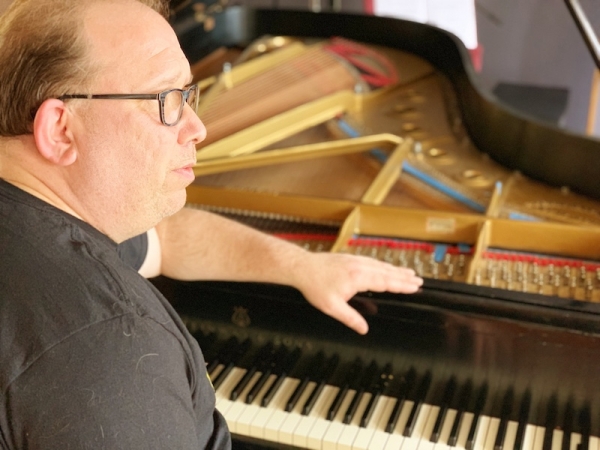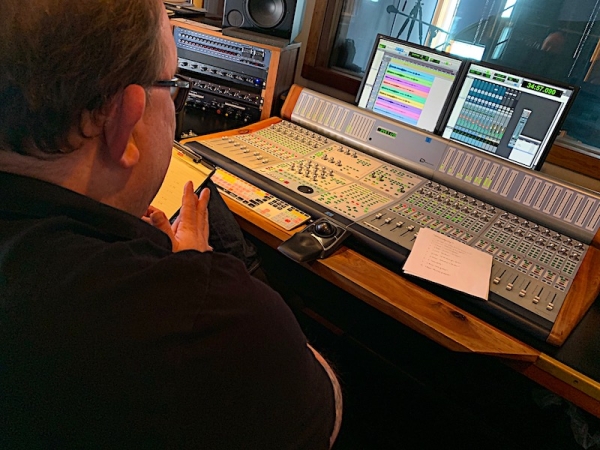Cupid Blindfolded, Michael Whalen's first purely solo piano album in twenty years will be releasing later this week on July 12, 2019. Michael has been involved in a dizzying number of projects of late and took the time to chat with MainlyPiano about the new album as well as some of his other activities. Enjoy!
KP: Hi Michael! I’m listening to your gorgeous new album, Cupid Blindfolded, as I write these questions and think this one will definitely hit the top of the charts. Tell us about it.
MW: Oh, Kathy…. thanks so much. We’ve worked hard on this one. The last “acoustic” piano album I made was back in 1999 was my recording The Softest Touch. But after doing many, many piano recordings w/ instrumentation, it was time to do a “back to basics” recording. I was nervous. But I think finding the right environment was crucial. Going to Will Ackerman’s studio in Vermont was a no brainer. Gorgeous.
KP: How did you come up with the title?
MW: It comes from a Shakespeare sonnet… basically it means that love is blind.
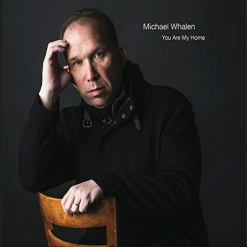
Click on the album covers to go to
Kathy's reviews.
KP: You recorded the album at Imaginary Road and Tom Eaton engineered the recording, but I don’t see Will’s name on anything. Was it just you and Tom working on it?
MW: (Laughs) Will was just a wonderful host. His energy and spirit is infused in his studio and his home. It’s amazing. Tom is a dear friend and a genius. How could I go wrong with him behind the board? Tom engineered. I produced. Will also owns a incredible Steinway grand piano that has magic infused into it. I am NOT a Steinway guy. But this instrument is amazing.
KP: So I’ve heard!
What was your process when you wrote the music?
MW: I always start with titles. I write the title first to help me capture the feeling and the image I have in my heart. After 30 years of scoring films, my music is always programmatic. On this project, I think I surprised myself how deep I went emotionally with the titles, memories and ideas even before I ever touched a keyboard. Once I started writing, the ideas just flowed and I was very surprised how quickly the music came together.
KP: How much of the music was improvised on the spot?
MW: Much less than most of my other piano projects! (Laughs). Seriously, I really wanted to compose complete thoughts with tight formats. I did that on 9 of the songs. “Serendipity” is 100% improvised. I let myself go “out” harmonically and it provides a nice color to the rest the songs. I love improvising - - but this album needed structure because as we were recording the album - - we also shot video of every take of every song from 6 cameras!!! So, I needed to walk in prepared.
KP: Wow! Why such an emphasis on video?
MW: This is the age we live in. People want to SEE the performance and be part of the creation of the music they love. The way we shot the video - - you can see everything simultaneously. I think people will like it. It put a lot of pressure on me to do complete takes with NO editing of the piano. Editing the audio and then trying to make the video match would have been a nightmare. Here’s the
YouTube link.
KP: Do any of the pieces on the album have special stories that go with them?
MW: Do we know each other well enough for me to tell you THESE stories??? (Laughs) Well, here’s a story: “Sunrise in the Desert” was inspired by the time I spent in Arizona in 2017. I would love to wake before sunrise and watch the desert transform from night to day. The silence is intense. Scary. You can hear your breath, your heartbeat and your thoughts are screaming at you. But you can hear the animals start moving in the sunshine. The world lights up. I really came to embrace the silence in the desert. I think it’s important for composers to be in the presence of silence as often as possible. I loved the desert. Maybe its because I live in the city - - the middle of Brooklyn. Sirens. Traffic. Craziness. So, I crave silence.
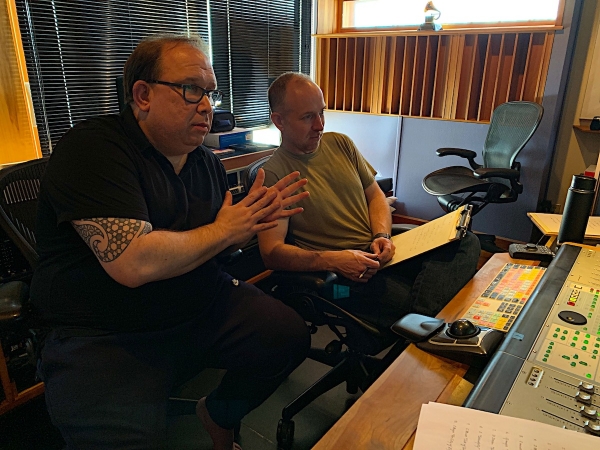
Michael and Tom Eaton.
KP: That’s why I moved to the Oregon Coast from the SF Bay Area.
Do you plan to release sheet music for any of the pieces on Cupid Blindfolded?
MW: YES!!!! The book of transcriptions is already available at
SheetMusic.com.
KP: I’m so glad to hear that! I will have the songbook reviewed before the release date and links to reviews of both that and the album will be on your
Artist Page on MainlyPiano.com.
Cupid Blindfolded is being released by “Solace: a division of Real Music,” but I can’t find anything about the label on Real Music’s website or anywhere else. I’m very familiar with Real Music in the SF Bay Area, but not Solace. Tell us about that.
MW: Solace is my own imprint label. I was talking to Real Music about a record deal and they came back with the idea of giving me my own imprint. It’s been wonderful partnering with Real Music on this venture and being “the boss” and having a team of people who really care about getting this right.
KP: Are you the first artist Real Music has given an imprint label to?
MW: I am not sure. I am very happy that they gave it to me. I have a unique set of skills outside of music: I have been the head of marketing for two successful companies, I do my own art direction, layout and graphic design and I am a very good video editor. So, I think Real Music wanted to capitalize on the total me along with the music to get the word out about these new releases. Cupid Blindfolded is but the first.
KP: You were one of quite a number of illustrious pianist/composers on the Narada label(s) back in the 1990’s, and your discography on your website shows that you were also a producer and arranger for the label. How many albums did you release on Narada?
MW: I did 6 albums for Narada as an artist. I produced an album for David Arkenstone and several compilations. I loved working with them and I will be forever grateful that they started my career as a recording artist. Narada in those days was really a community of artists. It was an honor to be among them and that so many of the artists are still my friends.
KP: There were some fantastic artists on Narada in its heyday!
I remember David Lanz telling me several years ago that you were working on an album with him and Kristin Amarie. Did that happen?
MW: David is a close friend and he, Kristin and I recorded three songs about 5 years ago. We had a blast in my basement studio in Harlem. We called our collaboration Azure. We did release one song. We three are so busy, they had twins and we live so far away that this might be the only thing that Azure gets to finish. You can
watch the video here.
KP: You were also on some of the Windham Hill compilations. Did you do any solo albums on that label?
MW: No, no solo albums but I was featured on a number of compilations as a producer and performer including Songs Without Words that featured top songwriters performing their own music on piano including Stephen Sondheim, Brian Wilson, Bruce Hornsby, David Foster, Carole King, Diane Warren and others. That was an unbelievable experience. Wow.
KP: I have a copy of that album and still love it! How many albums have you released altogether?
MW: I have released 32 albums in new age, soundtrack, singer/songwriter, classical and jazz.
KP: A lot of people may not know that you have written more that 800 scores for films and television as well as thousands of commercials. You’ve won two Emmy® Awards and been nominated eight times. What have been some of your favorite projects?
MW: I have been blessed to have worked on some great shows, ads and films that have been seen and heard by billions of people. Billions!!! (Laughs) It’s fun to say billions - - but it’s true. I have lots of favorites, but the music that most people have heard is my theme for “Good Morning America”, music for Oprah, “Inside Edition”, HBO IDs, Comcast ID, PBS ID, ads for Pepsi, Apple, Coca-Cola, Toyota, BMW, hundreds of TV shows and 22 indie feature films. One project that people might remember is the film What the Bleep Do We Know? I actually “ghost wrote” a piece of the score. I love that film and its message.
KP: You have also created a body of work considered classical. How is that different from your more ambient, new age music?
MW: Yes, I have written about 30 classical pieces. I have written two string quartets, a number of chamber pieces and string orchestra pieces. The big difference is that I write this music with NO technology and NO keyboard. Classical music is a an opportunity for “pure” composition. For me, that means writing ONLY what I hear. I think it's important to write in different modalities. I find if I write at a keyboard too much that it’s my hands that do the writing and not my brain. It becomes about muscle memory and the shapes of my hands. So, my classical work breaks that habit. I am very honored that many prominent performers have performed and recorded my pieces. If people want to check out one of my classical pieces, try
“The Shadows of October.”
KP: You have also been an adjunct professor at a very impressive number of schools. Tell us a bit about that.
MW: I love teaching. I think we have a responsibility to make a difference and to be of service to others. I have taught at The Berklee College of Music, NYU, The City College of New York, The New School and now, the Fashion Institute of Technology this fall. After teaching film scoring and music business, I am teaching media communications. I am very excited about being challenged by students. It’s how I grow and stretch myself. It’s a privilege to teach.
KP: I agree! I’ve been teaching piano for 38 years!
How old were you when you wrote your first piece of music?
MW: My first “official” piece of music was written when I was 14 years old. I went to a studio in Bethesda, Maryland and recorded all the instruments on a “jazz” track I had written to get into the Interlochen Arts Center in Michigan for their summer program. It was a big deal in 1980 to multitrack all the parts together with NO sequencer or computer. What’s amazing is that 38 years later I rearranged and recorded that song now called “Childish Dreams” on my recently released jazz recording…
Here is the original Interlochen demo and
here is “Childish Dreams.”
KP: When did you know you wanted to become a professional musician?
MW: My father took me to see the movie “The Cowboys” starring John Wayne in 1972. John Williams did the music - - which is sublimely perfect. I walked out of the theatre thinking “I have to learn how to do that.”
KP: Who are some of your favorite composers or major influences?
MW: OMG… this is the hardest question!!! Can you give me a few days to answer it??? (Laughs) Well… John Barry (great melodist). Thomas Newman (always perfect music and textures). John Williams (for always knowing how to give a film its beating heart). Keith Jarrett (for being a genius). Mark Isham (for showing me how organic electronics can be). Recently, I have also come to love the music of Lisa Gerrard, Agnes Obel and Terence Blanchard.
KP: What has been your most exciting musical moment?
MW: In 1993, I conducted my first “big” television score with a room of 60+ musicians in studio A at the Power Station in New York. I put my hands down and music I had written 48 hours before filled the room. It was intense. It was so gorgeous. Musicians in New York City are so, so, good. They sight read the charts. I could barely breathe. I tried to be cool through the first run through until we got to the end and all the violins noticed I was crying. So much for cool!
KP: Awwwwww! I’m sure they were very touched as well!!!
MW: My proudest moment was sitting in the stands in Minneapolis at the Superbowl in 1991 with my Dad. We had a little battery powered TV (for replays) - - remember those???? As the game went on, commercials I had scored kept being broadcast. That year I had five spots on the game. My father was dumbfounded. That is hard to do to my dad - - trust me! (Laughs)
KP: That must have been quite an experience for both of you!
I read that you don’t own a piano. How can that be?
MW: (Laughs)… well, I NEVER said I was a pianist. My wife and I live in a little apartment in Brooklyn which also houses my writing studio - - so, we don’t have room for a piano. I have a Yamaha Clavinova that I practice and write on. That’s why going to places like Imaginary Road where the piano is so amazing is a treat.
KP: I hear that you are starting to produce for television. Tell us about that.
MW: Well…. yes, it’s true. I had an idea for a documentary series and we are shooting the pilot this Fall. I can’t say much about the show, but it’s about the creative process - the REAL creative process. I want to inspire people to act on their innate creativity. It’s a HUGE project.
KP: Wow! That’s something to really look forward to!
If you could have any three wishes, what would they be?
MW: Ooooooooh…. another tough question…
1. That my wife and children will always be healthy and happy.
2. That I die in bed composing music (like Beethoven).
3. That my music inspires people to love, express themselves and take actions beyond what they ever thought was possible. That would be amazing to have people so carried away by their passion and their authentic desires.
KP: Thanks, Michael, and very best wishes on the launch of Cupid Blindfolded!
To learn more about Michael Whalen and his music, be sure to visit
his website and his
Artist Page here on MainlyPiano.com.
Kathy Parsons
July 2019

